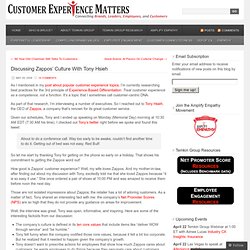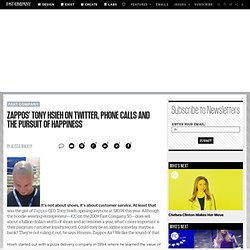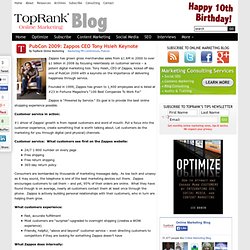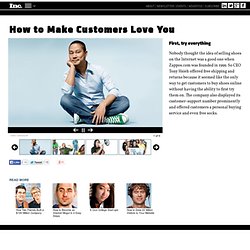

Discussing Zappos’ Culture With Tony Hsieh « Customer Experience. As I mentioned in my post about popular customer experience topics, I’m currently researching best practices for the 3rd principle of Experience-Based Differentiation: Treat customer experience as a competence, not a function.

It’s a topic that I sometimes call customer-centric DNA. As part of that research, I’m interviewing a number of executives. So I reached out to Tony Hsieh, the CEO of Zappos, a company that’s renown for its great customer service. Given our schedules, Tony and I ended up speaking on Monday (Memorial Day) morning at 10:30 AM EDT (7:30 AM his time). I checked out Tony’s twitter right before we spoke and found this tweet: About to do a conference call. So let me start by thanking Tony for getting on the phone so early on a holiday. How good is Zappos’ customer experience? Those are not isolated impressions about Zappos; the retailer has a lot of adoring customers. Well, the interview was great. I asked Tony if I could share some of our discussion in my blog. Like this: TC50 and Tony Hsieh. Tony Hsieh of Zappos - Startup School 2009.
Zappos' Tony Hsieh on Twitter, Phone Calls and the Pursuit of Ha. It's not about shoes, it's about customer service.

At least that was the gist of Zappos CEO Tony Hsieh opening keynote at SXSW this year. Although the hoodie-wearing entrepreneur—#20 on the 2009 Fast Company 50—does sell about a billion dollars worth of shoes and accessories a year, what's more important is their platinum customer loyalty record. Could they be an airline someday, maybe a bank? They're not ruling it out, he says. Hmmm, Zappos Air? Hsieh started out with a pizza delivery company in 1994 where he learned the value of making people happy (Zappos COO Alfred Lin was his #1 customer).
And for a web company, their phone skills are impeccable. But here's the real secret to customer loyalty, he says: It's actually making corporate culture a priority. Zappos also produces a 500-page Culture Book where they ask every employee to write a few paragraphs about working at Zappos, good and bad. But Hsieh's also got a very interesting side project: He's been studying happiness. Zappos.com CEO Tony Hsieh: $1billion in sales. Zappos on Nightline. Tony Hsieh, CEO, Zappos.com , Tony Hsieh, CEO, Zappos.com leweb. Zappos' Unique Hiring Practices. PubCon 2009: Zappos CEO Tony Hsieh Keynote - Online Marketing Bl. Zappos has grown gross merchandise sales from $1.6M in 2000 to over $1 billion in 2008 by focusing relentlessly on customer service – a potent digital marketing tool.

Tony Hsieh, CEO of Zappos, kicked off day one of PubCon 2009 with a keynote on the importance of delivering happiness through service. Founded in 1999, Zappos has grown to 1,400 employees and is listed at #23 in Fortune Magazine’s “100 Best Companies To Work For.” Zappos is “Powered by Service.” Its goal is to provide the best online shopping experience possible. Customer service in action: #1 driver of Zappos’ growth is from repeat customers and word of mouth. Customer service: What customers see first on the Zappos website: 24/7 1-800 number on every pageFree shippingFree return shipping365-day return policy Consumers are bombarded by thousands of marketing messages daily. How to Make Customers Love You. Nobody thought the idea of selling shoes on the Internet was a good one when Zappos.com was founded in 1999.

So CEO Tony Hsieh offered free shipping and returns because it seemed like the only way to get customers to buy shoes online without having the ability to first try them on. The company also displayed its customer-support number prominently and offered customers a personal buying service and even free socks. In 2003, Hsieh moved the company from San Francisco to Las Vegas, to tap into the city’s large pool of experienced call-center workers who are accustomed to working overnight shifts.
(There are also lower taxes in Nevada.) As Zappos built its 24-hour call-center operation, it eschewed the restrictive policies common in many such operations. How do you make sure that a company’s culture doesn’t fall apart as it expands from 15 employees to 1,500?